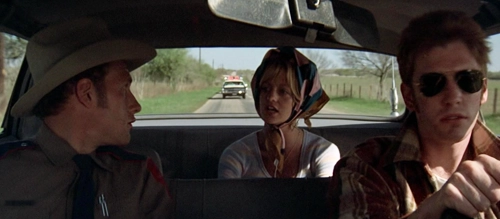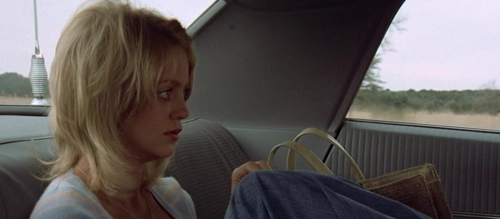‘The Sugarland Express’ at 50 – Review

The Sugarland Express (1974)
Director: Steven Spielberg
Screenwriters: Hal Barwood, Matthew Robbins
Cast: Goldie Hawn, William Atherton, Ben Johnson, Michael Sacks, Gregory Walcott, Steve Kanaly, Louise Latham, Dean Smith, James Kenneth Crone
The Sugarland Express was technically the first theatrical feature from Steven Spielberg (1971’s Duel was made for TV yet released in cinemas internationally). And it represented a significant ‘what if’ for the young director. What if he made more films like this on-the-lam crime drama? What if he continued the realism of the Hollywood Renaissance? What if he made Jaws and headed towards studio blockbusters? Spielberg chose the latter path, forever changing American cinema. It made his debut The Sugarland Express a relatively minor entry in his storied career. Fifty years after its release, it is time to revisit a terrific and enjoyable film that initially feels more in line with Hal Ashby than the future mind behind E.T. – or so it seems.
When Lou Jean Poplin (Goldie Hawn) visits her husband Clovis (William Atherton) in a Texas prison, she reveals that their infant son Langston has been taken into foster care in Sugarland. Not to worry though: she has a plan to get back their son and move to LA. The first step is to break Clovis out of prison and hitch a ride with an elderly couple. But then Clovis and Lou Jean inadvertently kidnap a state trooper named Slide (Michael Sacks) and take him hostage in his police car. In hot pursuit is Captain Harlin Tanner (Ben Johnson), a sheriff with a no-kill record. However, as he tries to save Slide, this hostage situation soon becomes a travelling media circus.
As the opening title states, The Sugarland Express is based on a real-life event that took place in Texas in 1969. Spielberg and writers Hal Barwood and Matthew Robbins take that true story and turn it into a high-speed, at times picturesque chase film. There are a trio of brilliantly believable performances from a vivid Hawn, a subtle Atherton, and Johnson as the grizzled and noble veteran. They each add a grounded edge to this story. Barwood and Robbins’ script makes it imperative that you at least somewhat buy into the Poplins and their state-wide, officer-capturing journey. With their playfulness, humour and youthful naivety (compared to Warren Beatty and Faye Dunaway in Bonnie and Clyde), Hawn and Atherton make it incredibly easy.
Meanwhile, director of photography Vilmos Zsigmond (Close Encounters of the Third Kind) uses the small Panaflex 35mm camera – which had just been invented – to provide some nimble, creative and successfully produced imagery. There are 360° shots in the car and split diopter shots of characters looking through windows or rear-view mirrors. There is even a dolly zoom, a technique that would become synonymous with Spielberg. That is not the only reason The Sugarland Express is historic: for instance, it was his first collaboration with legendary composer John Williams, whose great Americana-influenced score (featuring Toots Thielemans on the harmonica) becomes more dramatic as the film progresses.

It was also the first instance of perhaps the most recognisable Spielbergian theme: broken and torn apart families. Before the absent father of E.T. the Extra-Terrestrial or the divorcing parents in the semi-autobiographical The Fabelmans, there was Clovis and Lou Jean: two criminals with the justified intention of getting back their child, who they feel has been taken from them. And there is some support for their cause, with well-wishers giving them money and diapers as they near Sugarland.
This quest for family is presented in a narrative akin to Bonnie and Clyde or Terrence Malick’s Midwest-set Badlands. The allusions to Badlands are particularly pertinent to the fork in the road for Spielberg, as Malick continued with that gritty American New Wave style with Days of Heaven before taking a break and eventually taking more experimental strides.
But whilst The Sugarland Express has similarities with those movies, there is a lot more bickering and bumbling. This is not a smooth kidnapping – Lou Jean needs to pee, Slide needs to be given directions, and the car needs gas. Nevertheless, as a bond starts to form between them and Slide, the Poplins carry on with the belief they will be reunited with their son. It all leads to what is an extraordinary ending that isn’t as bloody as Bonnie and Clyde but has that film’s pathos. You sense it coming a mile away, but it is still tragic, partly thanks to Spielberg’s assured direction.
The Sugarland Express is a superb movie that feels like a journey – one that is thrilling, madcap and funny in an unorthodox, almost slapstick way. It may be unrefined and a little awkward by Spielberg’s subsequent standards, but it hosts the themes and techniques that would become the great director’s hallmarks. And looking back (or rather ahead), it compares more than favourably to some of his other dramas. Films like The Post and Bridge of Spies are certainly polished, but The Sugarland Express has a sense of excitability. Half a century later, that makes it a unique and underrated gem in Spielberg’s body of work.
Score: 20/24
Written by Daniel Allen
You can support Daniel Allen in the following places:
X (Twitter): @dan_allen00
Portfolio: Daniel Allen

